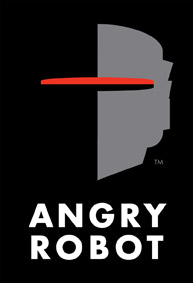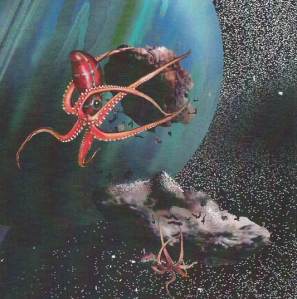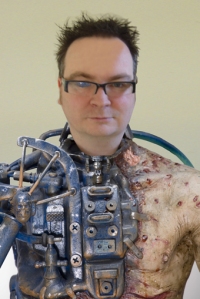We’ve Moved! March 9, 2009
Posted by Lee in Uncategorized.add a comment
Thanks for stopping by – we only ever paid rent at this site, and we’ve gone and bought ourselves a condo.
You’re all welcome at chez Robot, so head on over to http://www.AngryRobotBooks.com and say “Hi”.
Don’t forget to set your RSS feeds…
Thought you might like to see this… March 6, 2009
Posted by Marco in Angry Robot.1 comment so far
 Rather a smart little thing. We’ve had it for a little while, actually, but now’s a good time to show it off.
Rather a smart little thing. We’ve had it for a little while, actually, but now’s a good time to show it off.
Also worth showing off: our new website will be up on Monday. It includes details of our first releases and how you can sign-up for our robot army. Busy people, us.
Six words, no more, no less March 5, 2009
Posted by Marco in Future formats.add a comment
The concept of Six Word Stories apparently started, or at least gathered a great apocryphal origin, when someone bet Ernest Hemingway he couldn’t tell a story in such a short space. The response of the great man – “For sale: baby shoes. Never worn.” – still carries a real punch today, where in these times of Twittering and Flash fiction the six worders have made a real comeback.
Check out all the best recent Science Fiction entries, including this cracker from Alan Moore:
Machine. Unexpectedly, I’d invented a time
New blog at SFX March 3, 2009
Posted by Lee in Other people's business.add a comment
A quick plug for my new blog elsewhere in the cyberverse. I was recently chosen as one of 12 volunteer bloggers for SFX – the best-selling British genre features magazine.
Head on over to SFX Magazine to see my thoughts on audio drama, and the season of SF audio currently airing on Radio 4 and Radio 7…
Philip José Farmer March 2, 2009
Posted by Lee in Writers.add a comment
Sex in Genre Fiction

Image of the Beast by Philip Jose Farmer
It’s not common to find scenes of a sexual nature in science fiction, horror or fantasy books – it’s not unusual, but it’s not common.
What does it matter? Why should a book contain a sex scene? Well, the answer (and it’s the answer to any similar question) is: it should contain such a scene if the scene is important. If it’s an event that moves the plot along, or helps to further character development.
Pick up any early James Herbert novel, and you’re pretty much guaranteed to find a couple of pages devoted to the protagonist getting his or her rocks off. Heinlein’s Stranger in a Strange Land resulted in the man himself being credited as popularising the concept of polyamory.
It was Philip José Farmer, however, who is accepted as having broken the taboo on sex in science fiction. His 1953 Hugo-winning story The Lovers catapulted Farmer onto the scene, and when Heinlein wrote Stranger… in 1961, it was partly dedicated to Farmer.
It’s not Farmer’s only contribution to SF, of course – he’s best-known for his World of Tiers and Riverworld series, but next time you sit with a genre novel and stumble upon some characters sharing an intimate moment, spare a thought for Farmer.
Philip José Farmer – 1918 to 2009, Rest In Peace.
How long could you survive… February 19, 2009
Posted by Marco in General skiffy bollocks.1 comment so far
in the vacuum of space?
eReaders February 18, 2009
Posted by Lee in Books, Future formats.2 comments
We’ve been thinking about eReaders in the office, and wondering whether to get one. They’ve been pretty popular with editors, recently, and with good reason. Carrying multiple novel submissions in hardcopy isn’t practical, and reading from a computer monitor is ok for a short while, but not for long periods of time (and again, it’s not practical to take one everywhere you go, just on the off-chance you’ll find some spare reading time).
 A dedicated electronic reader, though – that’s a practical option. They’re generally the size of a hardback book, and the better ones use something called electronic ink – a process that makes the screen as easy to read as paper – with little or no glare from other lighting sources, and readable in bright sunlight.
A dedicated electronic reader, though – that’s a practical option. They’re generally the size of a hardback book, and the better ones use something called electronic ink – a process that makes the screen as easy to read as paper – with little or no glare from other lighting sources, and readable in bright sunlight.
There are a few problems with eReaders at the moment, though, and although they have generally been solved there is a geographical disadvantage. The Sony PRS 550 eReader, for instance doesn’t allow you to annotate manuscripts – the replacement PRS700 does, but it’s not available here in the UK, yet. Likewise, the Amazon Kindle (and Kindle 2) is a US-only device.
The problem was largely solved for me recently by a friend who gave me an iPod Touch (everyone should have friends like that).
On her recommendation I downloaded an eReader application called Stanza. It was the work of but a few moments to ascertain how to get the Angry Robot submissions list onto the device, and while it doesn’t allow annotation, it’s small enough to put in my pocket wherever I go, and that’s a good trade-off.
The screen is big enough to make reading pleasurable, and extremely clear. In fact, the more I use it, the more I wonder why manufacturers of dedicated eReaders feel it necessary to make them ‘book size’. Surely, the advantage of an eReader is that it can carry hundreds of books in one – size and weight is evidently a major factor, so why not go the whole hog and reduce the dimensions?
Perhaps the reason is that at over £200 a device, the manufacturers feel it necessary to give some physical substance to the device.
Personally, I don’t want something bigger. I’m perfectly happy with Stanza on my iPod. It works well, so why carry something bigger? I can carry the entire Angry Robot submissions list with me wherever I go, and it weighs no more than a mobile phone. Surely that’s the point of an electronic book…
The real reason Angry Robot employed me. February 6, 2009
Posted by Lee in Angry Robot.2 comments
Hell – you use any advantage you’ve got!
What is “genre-enough”? January 28, 2009
Posted by Lee in Angry Robot, Submissions.9 comments
 I stated in my previous post (“So, Uhhhh… Hi”, below) that we had recently rejected some manuscripts that were not “genre enough”, and received a question back “what does the angry robot think is ‘genre enough’?”.
I stated in my previous post (“So, Uhhhh… Hi”, below) that we had recently rejected some manuscripts that were not “genre enough”, and received a question back “what does the angry robot think is ‘genre enough’?”.
A thoroughly deserving question.
There are many criteria we use when deciding whether a book is suitable for Angry Robot (a major one being, of course: did we enjoy reading it? – it’s often such a subjective game). The question of whether a book is “genre enough” is an important one.
I can’t go into details about the rejected books themselves, as the authors will still be seeking suitable publishers, so I’ll talk in general terms.
Let’s look at the Bond movies. They’re usually reviewed in SF magazines and forums as they tend to contain gadgets that don’t exist, yet – an invisible car, a jet-pack that actually works, etc. There is an argument to say that these are science fiction films. I’d argue against that, and say that while they contain future-technology, the films are straighforward spy thrillers/action movies. The SF elements don’t actually matter to the plot – they’re just there to make the viewer think they’re watching something cool. Remove the invisible car or remote-control helicopter, and the film is still intact.
If you can remove the genre element without harming the flow of the narrative, it’s probably not genre enough.
For a book to be considered suitable it must not only wear its genre credentials on its sleeve, but probably on its underwear, too. It may even be tattooed on its buttock.
If your main character happens to live in a haunted house, and enjoys regular conversations with the ghost that’s based there, that’s a supernatual element. However, if the ghostly conversations add nothing to the plot (eg. if the ghost could be switched with a mundane, human flatmate, or simply removed completely without disrupting the plot), then the story is not genre enough. The fantastical elements of the story must not simply be a painted canvas against which the rest of the story takes place, they must be integral and vital to the tale being told.
Similarly, if your book is about the break-up of a long-term relationship, and your protagonist just happens to be a werewolf, that’s probably not enough to make it “genre enough”. Why is it important that he’s a werewolf (it’s important to him, obviously)? Is is lupine nature critical to the story being told, or is it merely a detail added to make the character more interesting?
The other answer, of course, is similar to the classic response to the question “what is science fiction?”
What is genre enough? We can’t give you a 100% complete answer, but we know it when we see it.
Learning from the greats January 28, 2009
Posted by Marco in Books, Writers.1 comment so far
![]() Every so often I have the massive honour of being asked to contribute to one of SF Signal’s Mind Melds, wherein the august genre news site gathers the great and the good, and some lowly publisher types too, to offer opinions on a particular topic. Being far more of a backroom boy these days, it was a major shock to find myself amongst some of my idols in this week’s Mind Meld, on the topic of the best writing advice one ever received. Robert Silverberg, Gene Wolfe, Walter Jon Williams… oh wow, I am definitely not worthy!
Every so often I have the massive honour of being asked to contribute to one of SF Signal’s Mind Melds, wherein the august genre news site gathers the great and the good, and some lowly publisher types too, to offer opinions on a particular topic. Being far more of a backroom boy these days, it was a major shock to find myself amongst some of my idols in this week’s Mind Meld, on the topic of the best writing advice one ever received. Robert Silverberg, Gene Wolfe, Walter Jon Williams… oh wow, I am definitely not worthy!
Check out their sage words if you have any intention of becoming, or any experience of being, a writer.

